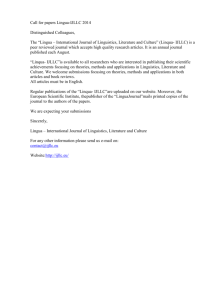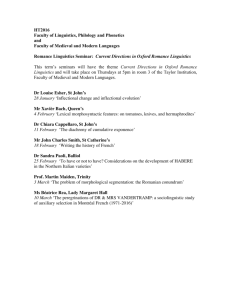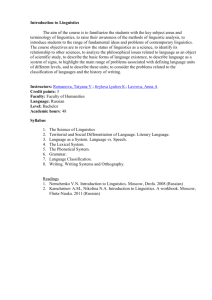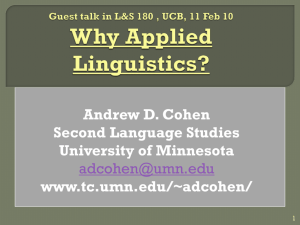1. Why linguistics?
advertisement
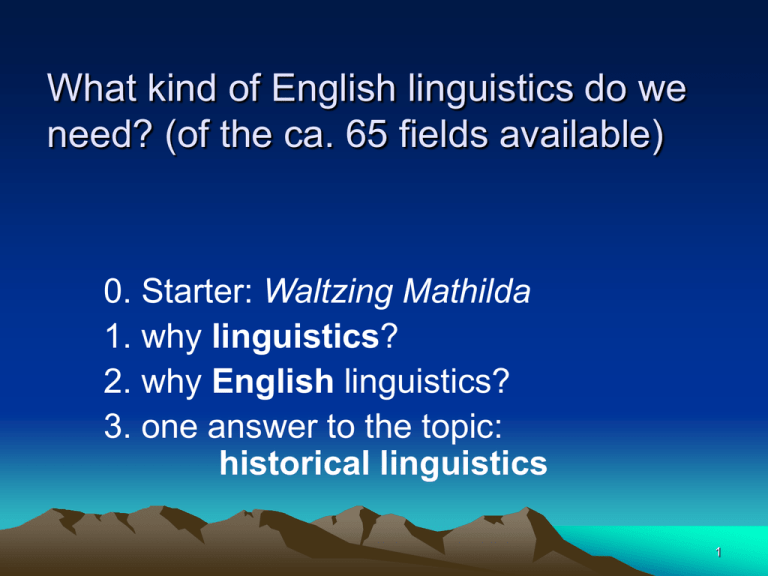
What kind of English linguistics do we
need? (of the ca. 65 fields available)
0. Starter: Waltzing Mathilda
1. why linguistics?
2. why English linguistics?
3. one answer to the topic:
historical linguistics
1
Starter: example Waltzing Mathilda
(1820s), now "national anthem"
Slim Dusty
+ 2003
swagman = AusE old-fash. 'man with clothes and possession
carried around'; swag slang 'stolen goods'
billabong ('temporary lake') climate
coolibah tree = 'eucalyptus' aborig.
billy = 'William', met. 'friend, pot for food'
jumbuck = Native Austr. jiimba, > jump-buck (folk-etym.), cf G.
Bock
songs preserve
tucker = Austr. slang 'food' (cf to tuck)
2
history/culture
tucker in close-up: OED2
to tuck 'ausstaffieren'
< ONFr or It. toccare? (Venice!)
3
1. Why linguistics?
Language, the object of linguistics, is the major
tool of human communication and of social life.
as against animals
language = very universal and multi-purpose tool for
making statements
giving commands
performing a speech act ("I herewith declare ...")
praising sb.
arguing with sb.
communicating complex thoughts
...
4
2. Why English linguistics?
E = world language
104 countries (McArthur)
general lingua franca
diplomacy
aviation and navigation
tourism
international scholarship
WWW: "Universität" 28 mill vs "university" 649 mill
Sowi now offers its lectures in English.
EFL is a foreign language of a diff. calibre than Fr or It
5
(1) geographical distribution of English:
McArthur's circle of world Englishes, from Crystal 1995: 111
e.g. Chinese,
Pakistani,
Tok Pisin
6
(2) GB was important, the US still are
E as a
lingua franca
7
(3) GB has one of the richest
cultures of Europe
literature: from Beowulf to The Beatles
high culture, pop culture, medial culture
(<US)
role of history, e.g. Alfred the Great
cultural history: e.g. Christianity
economic history: e.g. the railway
8
3. Why historical linguistics?
Orwell's warning: Newspeak (cf Essay in 1984, publ. in 1949)
many features
reduction of vocabulary
simplified WF (clippings: Agitprop, Gestapo; cf modern
acronyms [NATO, Excel] and initialisms [BBC, Stuko]
simplified grammar (thinked instead of thought etc)
main point: Newspeak cuts off language from its history
quote: "When Oldspeak had been once and for all superseded,
the last link with the past would have been severed."
implications of loss of history: no subtety of meaning, no
unorthodox opinions; associations clinging to traditional words are
cut out
a-historical language now: "Kollektivvertrag", "senior lecturer",
"lector"
9
"In need of history": special reasons in
English Studies
English provides a particular wealth of
language history
cf David Crystal 2004, The Stories of English
enormous range of material gathered to
demonstrate the diversity of English through the
ages (one of the reviewers)
600 pages on selected language-historical
aspects from OE to Tolkien's Hobbits (Crystal =
synchronic linguist)
Research deficits in view of
British dialects, spoken English
and international Englishes!
10
Selection of three features
(a) vocabulary: particularly rich and diversified
(b) sounds and spellings: particularly
traditional (unlike in German)
(c) communicative and cultural aspects:
exceptionally interesting
11
(a) Lexis: Quantification of various English
vocabularies (from Voigt, Langenscheidt/Longman,
1982)
1000000
800000
600000
# words
400000
200000
0
GenEng
Shakesp
Native
Non-nat.
12
English lexis: towards a survey
lexicology:
1. word field
2. semantics: metaph.
3. etymology
4. pragmatics: please,
terms of address
1. OE: heroic words, later relig. words (God, love, filth; later: sentimental)
2. kenningar: the bent-necked wood, sea-farer for 'ship';
whale-road for 'sea'
3. Roman, Celtic, Germanic; ON, Ofr, Latin in differ. times (Human.: debt, doubt)
4. Cultural background needed: please < Fr; change from four forms of address
to one (you/yee/thou/thee > you)
13
morphol. and syntax: thou, thee, you and ye in England
thou = sg. nom. (G. du)
thee = sg. acc. (cf Shp.)
you = pl. acc.
ye(e) = pl. nom.
Pl. acc. dominates over
the other forms.
14
Semantics: Explain word pairs
forgive/pardon
shirt/skirt
cow/beef
dish/disk
chief/chef
PN Laing/Laird – long, lord
15
Etymology creates transparency: cognate English borrowings from Fr.
and Lat. (Bodmer n.d., pp. 282)
Engl. Words < Frz.
Engl. Words directly
Latin
< Lat.
conceptum
constrictionem
conceit (Einbildung)
constraint (Zwang)
collocare
computare
quietus
dignitatem
defectum
aestimare
factionem
facto
fragilis
legalis
couch (sich legen)
count (zählen)
coy (spröde)
dainty (Leckerei)
defeat (Niederlage)
esteem (achten)
fashion (Mode)
feat (Kunststück)
frail (schwach)
loyal (loyal)
concept (Begriff)
constriction
(Zusammenziehung)
collocate (ordnen)
compute (berechnen)
quiet (ruhig)
dignity (Würde)
defect (Mangel)
estimate (schätzen)
faction (Partei)
fact (Tatsache)
fragile (zerbrechlich)
legal (gesetzlich)
16
2nd example: sounds and spellings
Extreme deviation of present pronunciation
and spellings – why:
–
English is more hybrid, i.e. it has been more
under the influence of other languages than, e.g.,
German; different sets of rules
–
17
Scandin.: to get, sky
French: employee, garage
In spelling, E. has been decidedly traditional since
the late MAs (Caxton).
some details
examples:
–
–
–
18
<-gh>: orig. (ME) a fricative [X], cf Scottish night, bright
-our, -or: orig. (ME) < Ofr (= ModFr –eur), weakened
pronunciation in E today: honour, liquor
photo, phenomenon: = Greek, in frequent words <f>
vowels changed most in the history of E, part. due to
GVSh (15-17th c.), therefore their spelling is partic.
misleading (rough, ought)
the present spelling is a mixture of diff. historical
processes (English = hybrid)
Rhotic pronunciation in England c. 1950
(from dtv-Atlas Englische Sprache 2002)
r lost
r kept
19
Menorha model applicable to histor. English phonol.:
correlation between historical stages and present varieties)
varieties
common
words ESP
roots
AE
dial. Austr Ld. North
19th c.
18th c.
ME
OE
French
Scandinavian
Germanic heritage
20
3rd example: Cultural studies
1. What is the Doomsday Book?
Bayeux tapestry
Harold is killed.
21
1066 and all that
1086
William the C.
Relevance of the Doomsday Book
"Grundbuch" (index of land ownership)
What happened in Britain in 1986?
22
1986
23
?
A stamp of 1986
?
?
?
24
Summing up: Historically conditioned complexity:
Taking-leave formulas
•
•
•
OED2: 1588 Shakes. L.L.L. iii. i. 151,
I thanke your worship,
– < God be with you/ye! (historical) phraseology; word field: religious
God be wy you.
1591
— 1 Hen. VI, iii. ii. 73
Good day!
God b’uy my Lord.
– arch./Austr. register/varieties
Goodbye!
Bye-bye!
–
•
Bye for now! Ciao!
–
•
idiomatic expressions: semantic/phonological implications
I hope to see you again!
Farewell!
Have a nice day/weekend!
Cheerio! (Br inf)
So long! (Br inf)
Hasta la vista, Baby! (US A. Schwarzenegger)
Piss off! F* off!
–
•
inform./fashion register/etymology
See you (later/next week/term).
–
•
•
•
•
•
•
•
iterative formation baby language/infantilisms in dialect/Tok Pisin etc
conclusion: E allows
many varieties/
is difficult
slang sociolinguistics, pragmatics
I must be off!/ I must be going! / I've got to go. --> grammar
25
prep. adj.
Fazit
• Viele heutige Wissensinhalte sind geprägt von Schnelllebigkeit und
immanenten wirtschaftlichen Interessen: Passwörter, BenutzerNamen, Call-Center, Hotlines, Zinssätze, Aktienkurse, Akronyme
• Umso mehr brauchen wir heute auch die klassischen, d.h.
langlebigen und bewährten Bildungsinhalte:
– Die Geschichtlichkeit der Sprache/des Englischen korrreliert mit unserer
eigenen Geschichtlichkeit und der unserer Kultur.
– Die strukturelle und quantitative Komplexität des Englischen heute, als
Folge seiner komplexen Geschichte, bietet eine Vielzahl langlebiger und
wichtiger Wissensinhalte.
– Ahistorizität = menschliche Entwurzelung
– Der Strukturalismus des 20 Jhds. (de Saussure etc) und die derzeit
modische Beschränkung auf Anwendungsmodelle (Applied Linguistics)
werden der Tatsache, dass wir sprachlich und kulturell historisch
verwurzelt sind, nicht gerecht.
• Und wenn Sie mich persönlich fragen, ...
26
• We can learn for our
future by knowing our
personal past.
1 year ago
30 years ago
Thank you for your attention!
27


